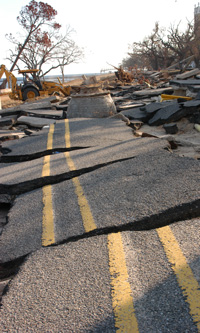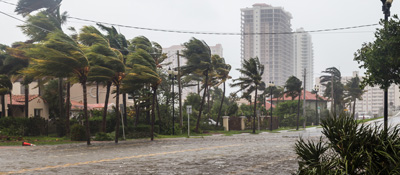Late last summer and even into the beginning of fall, the United States mainland and possessions in the Caribbean — especially Puerto Rico — were buffeted with a succession of hurricanes that showed just how vulnerable citizens, their possessions and businesses were to the machinations of natural disasters. If anything, the experiences that were the focus of countless hours of media attention drove home the point that individuals and businesses had better plan ahead and be prepared to continue business if they hope to continue operating under the most unfortunate circumstances.
Taking a Look at the Houston, Texas, Area First
When Scott Leidolf, TALON Technical Sales Inc., Houston, is asked about his experience during Hurricane Harvey, he is more than ready to recall events and quickly responds with a question that shows he’s had a lot on his plate: “What do you want to hear first, the business or personal?” Taking the business side first, he notes that “Fortunately, we knew the storm was coming and were able to prepare ourselves.”
The agency, which does no stocking, had only to protect its business operations but even so he notes they were out of business for about a week and a half. Explaining that the agency actually thought ahead of time as it developed a disaster plan, he explains, “We put everything up as high as we could. One major step we took was to move our computer servers to a secure downtown location where they will remain.”
TALON represents technical product lines in the areas of physical measurement sensors and instrumentation. Products include temperature, pressure, flow, torque, vibration, load, position, moisture and current sensors, signal conditioners, as well as indicators, data acquisition hardware and software and specialty items for hazardous areas
Serving the states of Texas, Arkansas, Louisiana and Oklahoma, the agency works in a variety of industries including oil and gas, petrochemical and refining, water and wastewater, utility, food and pharmaceutical, research and development companies, engineering firms, OEMs and end users as well as systems integrators.
In developing a disaster plan for the agency, Leidolf agrees with the philosophy that just as an agency should have to devote time and effort to developing strategic, succession and marketing plans, so too should it have a disaster plan in place. Having said that he explains, “We’re just a rep agency with about five people in the office when the salespeople aren’t here. If we were a stocking operation with multiple personnel, it might have been a different story.”
He adds, “I’m not big on decisions by committee. What we did was just identify what we had to do and then get the job done.” In addition to protecting the agency’s servers, he says that it took about a week before personnel could operate efficiently out of their home offices.
When asked about how the hurricane affected customers and principals, he says “Our customers were out of business just as we were, so we were all in the same boat. In terms of the reaction of principals, they stayed in touch with us and were very supportive.”
As Leidolf and the agency continued to recover, on the personal side he notes that his recently remodeled home was pretty much “taken out.” “We recently had custom cabinets and wooden floors installed and that was all impacted by the flooding that came in the aftermath of the storm.”
One lasting memory he maintains he takes away from the event were the contributions of what has been referred to as the “Cajun Navy” (individuals from neighboring Louisiana who traveled neighborhoods in their own boats rescuing Houston residents. “They were very unselfish and did a great job for us.”
If there’s anything to be learned from the experience, Leidolf says “In events such as this, be careful, ensure that important things are kept as high off the floor as possible and keep anything significant in a suitcase and be ready to move in a hurry.”
Taking Positive Steps
As he looks back on his Hurricane Harvey experience, Toby Roberts notes, “I’ve been through hurricanes like Carl and Allison and I realize there’s not a lot you can do as far as protecting business. There are some positive steps to take, however. One important thing is to pay attention to media reports and follow advice from officials. Too many people don’t do that. There are always some people who decide they’re going to ride out a storm and that’s where so many problems develop.”
Roberts, Stan Roberts & Assoc., Inc., Houston, recalls that with this storm “We had three or four days’ notice that it was coming. Even so, there’s wasn’t really a great deal we could do.”
In business since 1970, Stan Roberts & Assoc., Inc., serves the plumbing and utility industries. The agency serves Texas and surrounding states through their stocking warehouses located in Houston and Dallas.
Roberts says that the agency’s Houston warehouse is located east of downtown. “Fortunately, we had few problems and no flooding. We were down for about a week, but so were our customers. On the personal side, we had only three employees whose homes were flooded.”
And Then Came Irma
Close on the heels of the devastation delivered by Hurricane Harvey, next came Irma with her own message of destruction for Florida.
Joe Murphy counts himself and his agency among the lucky when it comes to dodging the damage that accompanied Hurricane Irma throughout the state of Florida. According to Murphy, president, Crane Sales Company, Tampa, “We were truly fortunate in that the storm was originally forecast to hit the state’s east coast. Then the forecast was changed to hit us in Tampa, but almost at the last minute it veered to a neighboring county and pretty much missed us. What developed is that the storm was so massive everyone began to move west. We certainly had our share of wind and rain but nothing horrible like the rest of the state that the whole country saw on the news.”
Crane Sales Company has served the southeast United States for the more than 70 years.
As to how the hurricane affected Crane Sales and its customers, Murphy explains, “Many of the stores we work with were closed for a while but I’m sure it was a lot worse south of us in Naples, Fort Meyers, and the Orlando area.”
Murphy explained that “Just about everyone in the company has lived their entire lives in the state. As a result, we’re used to experiencing hurricanes and do, in fact, have a plan and protocol in place for what we have to do.”
In terms of disaster preparedness, Murphy notes, “There really isn’t a lot we could learn from this experience. If anything, it teaches you how important luck is. You can be told something is coming your way, you do all you can to prepare and then at the last minute you dodge it.”
Button Up Everything
A bit to the east of Tampa, in Orlando, Chase Freeman, vice president of the Spirit Group, Inc., recalls that “We closed the agency on the Friday morning prior to the storm. Our first thought was that we had to button up everything — and that’s just what we did.”
The Spirit Group, headquartered in Orlando, covers a number of market segments, selling through wholesale distribution partners, and calling on residential plumbing and commercial/mechanical contractors, specifying engineers, architects and builders. The agency represents manufacturers of pipe, valves, fittings, plumbing fixtures and accessories.
According to Freeman, “In terms of evacuating people from the path of the storm, we’ve never seen anything like this in the history of Florida. Realize for a moment that from south Florida, you’d have to drive eight-nine hours to get out of danger. As I look back, we certainly got lucky with just having some trees down and little overall damage to our employees’ homes. We experienced maybe an eight-day power outage, but in general that was about it. Not everyone was that lucky.
“At the agency, we lost the Internet and phone service for maybe two days. In addition, there was no UPS or freight service and only a few of our customers were working. But, as early as the Monday and Tuesday following the storm, we were in the office and back at work.”
As far as the agency’s physical premises, Freeman says “We’re a tilt-wall concrete warehouse building and we were really worried about losing the building. Obviously that didn’t happen.”
What was the lesson learned from enduring the hurricane? For Freeman and the agency, “We’ve gone through this all before so to some extent it’s somewhat second nature. You know what needs to get done, so you just do it. Assuming that you’ve been given advance warning of the storm — which we were this time — there’s not much you can do but stay as long as you can and be safe. Be sure to clean up your place and make sure all the families are taken care of. In terms of overall preparedness, you lock everything down and prepare for a hit and hope for the best.”
“You can’t be stupid in your decisions and you’ve got to realize that you’re there for your customers and suppliers. In the business we’re in, you’re only as good as your Internet and phone provider. That’s why it’s important to get as much shipped in advance of an event that you can. We completed as much work as we could over the phone before the storm and even did some old-school order entry. We manually wrote down orders and if they couldn’t be entered immediately we kept a log of what had been shipping.”
Next in line to Harvey and Irma came Hurricane Maria, which if anything put a final stamp on the warning that Mother Nature can deliver to any business. Stay informed, be prepared and develop a plan that will allow you and your business to survive.
MANA welcomes your comments on this article. Write to us at [email protected].



